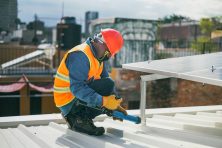These Coffee Lovers Brewed Up a Florida Business From the Back of a Bike

Decision-making, long hours, late nights, financial concerns, constantly changing plans — it’s no secret that starting your own business is hard work.
It’s no different for the owners of Made Coffee, but at least they have direct access to a caffeine source at all times.
Specializing in canned and kegged cold-brew coffee — because, hello Florida heat — Made Coffee is on a mission to bring on-the-go, iced caffeine to the masses.
As the company continues to gain traction in the Sunshine State, co-founders Michael Rideout and Taylor Prater took some time from their 14-hour work days to look back at where they’ve been and talk about how far they want to go.
Biking With the Brews

Like many a good story, the origins of Made Coffee can be traced back to a beloved local bar.
Back in 2015, Rideout and Prater were both working at Mandarin Hide, a trendy cocktail bar nestled in the heart of downtown St. Petersburg. Thanks to the combination of popular espresso-based cocktails and an espresso machine that was constantly acting up, the idea for a cold, concentrated coffee product began to brew.
“We basically just started tinkering around, bought some equipment and started brewing out of the house,” says Rideout.
In keeping with their cocktail origins, they pitched the cold and nitro brew coffee creations in keg form to local bars and restaurants. They secured about five accounts to serve the product on tap in that first month.
Another good way to get word out about the newly made company? Hit the streets.
Rideout and Prater ordered a bike online and then hired someone to build a custom box frame — complete with a tap system — so that it was perfect for peddling the kegged coffee on the go. All in all, the custom bike ended up costing around $4,000 — about 50% of Made Coffee’s total startup costs.
They would do pop-up events with the bike, usually in front of one of their original account locations, but they really weren’t selling coffee as much as giving it out. And on top of that, they were selling their product to accounts at cost — basically just enough to cover what they were spending to make the brew.
Rideout says they focused on consumer education for the first year and a half — profitability wasn’t even on the horizon.
“We weren’t making any money,” he says. “We were trying to understand what we were doing, what the product was doing and get a lot of feedback from consumers to see what we needed to do.”
You Can Go Your Own Way

After building up brand awareness, they started toying with the the next step in the plan: Opening a cold brew-focused café.
Rideout shopped around downtown St. Pete for a location and came close to settling on a deal, but a meeting with a business mentor made him rethink his retail plan.
He realized that in order for the business to achieve a large footprint and be recognized on more than just a city- or county-wide level, he was going to have to stray from the arguably easier route.
Having seen examples of big-name, ready-to-drink coffee products growing in popularity, he realized that no local businesses in the area had gone the distribution route; they just stuck to local shops.
So wholesale was the name of the game, but again, with origins firmly rooted in the bar realm, Rideout and Prater didn’t want to stray too far. Hence the idea of canned, cold-brew coffee.
Navigating a New Business

Rideout had money saved up for the coffee shop idea and planned on securing another partner at some point, but getting into beverage distribution was a whole different beast. Building out a café could be done for around $150,000. But a beverage company? That’s wading into the millions of dollars territory — which is capital that the duo definitely did not have.
To help with the financial burden, they secured partners — who mainly work behind the scenes while Rideout and Prater handle the day-to-day operations. Then in September of 2016, they moved forward with a location for operations.
Dubbed The Cannery and coming in at 2,200 square feet, the facility build-out didn’t really start until January 2017. It took around four months to complete — and cost about half a million dollars.
While the team was waiting on completion of The Cannery construction, they started securing accounts before they even had a canned product to deliver.
“We had a little bit of a following, so we were teasing the idea,” says Rideout. “They were just kind of believing in us.”
And once they were finally ready to launch their canned coffee in April, they had customers waiting for deliveries right off the bat. And thanks to word of mouth, they secured another 20 accounts in the following weeks.
Those 20 accounts quickly turned into 50, and within two months of launching, the caffeinated duo were approaching their biggest pitch yet: Publix supermarkets.
With headquarters just two counties over in Lakeland, Florida, Publix was a good fit for the Made Coffee product. But after only working with local bars, restaurants and speciality grocers, pitching to a giant like Publix was no small feat.
“The learning curve was tough,” says Prater. “Their expectation was for us to already know all of these terms and processes and logistics, so we had to learn it very quickly.”
But their pitch was a success, and Made Coffee found itself in 10 Publix stores in the Tampa Bay area in August 2017. Not only did they have to work with the managers of each location to secure shelf space, Rideout and Prater stocked the shelves on their own.
“It was very early mornings,” says Prater. “But it was a really great experience because you really learn the back end of grocery.”
Making It Day by Day

In the beginning, Made Coffee was producing around 1,000 to 2,000 cans a day. Now, it’s churning out upwards of 15,000 per day.
Rideout and Prater have been able to run a pretty small production staff due to fast equipment, but their willingness to wear as many hats as it takes to get the job done has also helped.
“Our first couple of production days were bare bones,” says Rideout. “There was a production day that was just Taylor and me.”
“Which is not highly recommended,” Prater counters with a laugh. “But we did it.”
Weekly needs depend on the orders, or pars, but they typically follow the same production schedule: roasting one to four days a week, brewing five days a week, kegging two days a week and packaging one.
Then weekends are usually devoted to demos for potential customers and account visits — to make sure that everyone is happy with the product.
Rideout says he wanted to be involved in every aspect of the business, from delivering cans to visiting accounts to cleaning keg lines to fixing equipment to roasting and brewing coffee. But as Made Coffee continued to grow, taking on new local accounts and increasing its Publix presence, it made sense to bring on a little help.
The company is currently operating with a nine-person staff, but Rideout says that he and Prater still work 14- to 15-hour days on average.
“If there’s a 12-hour day, I feel like we missed something,” he says. “It’s just what has to be done.”
Pouring Over Your Business

Taking on the ambitious task of starting a ready-to-drink beverage company didn’t just have challenges on the business side — it took a personal toll on Rideout and Prater as well.
Both were still working full-time jobs when they started the company in 2015, and neither of them switched to Made Coffee full-time until 2017 — Rideout in April and Prater in August.
“From September 2016 to April 2017, all of my photos that I have of the build-out are at night at like 2 or 3 in the morning.” says Rideout. “I was working during the day and then coming over here and basically working… until I just couldn’t anymore.”
Both have only been paying themselves enough to cover their bills. All extra money has gone right back into the company. They’re both in favor of putting money toward equipment that will help them grow.
“I’d never been in debt,” says Rideout. “For the first time in my life, in 34 years, I have debt.”
Prater feels that in order to start your own business, you kind of have to take apart your life. And not just that, you have to be OK with taking apart your life. The long hours and devotion required to get it off the ground demand it.
Rideout agrees. “If you’re not willing to literally work as many hours as you have to and not sleep and be stressed on finances and wonder how you’re going to pay rent… don’t open your own business,” he says.
Brewing Up Growth

The long hours Rideout and Prater have put in over the years are paying off — Made Coffee recently achieved a huge milestone.
Previously, their canned cold brew could be found in 256 Publix stores. But as of Oct. 1, every Publix throughout the state of Florida features Made Coffee products. That’s a whopping 831 stores.
Additionally, Made has rolled out two new products in the past few months: bags of Made Coffee whole bean coffee and “Con Leche” cold brew, for the caffeine lovers who can’t tolerate the black stuff without a little cream and sugar.
To cope with the growth, they’ve signed a lease for a new 12,000-square-foot facility that will serve as a distribution hub and will be ready to roll in January of 2019. They’ve also brought on new equipment and staff, with plans to hire more throughout the year.
Prater says they plan on hiring about six remote employees who will manage designated areas throughout the state.
Overall, this next step for Made Coffee will cost an estimated $2 million — a far cry from the $8,000 in startup costs.
When Prater looks back to the beginning, she feels like she didn’t have any idea how to imagine the level of success they’re at now. But Rideout disagrees; he thinks everything is happening exactly as planned.
“I know that sounds crazy,” he says. “But I always say that if you’re surprised at what’s happening, you didn’t have confidence it could have happened.”
And no matter how big Made Coffee gets, both Prater and Rideout recognize the importance of remembering where they came from: Serving homemade cold brew from behind a bar to locals who believed in their dream.
Kaitlyn Blount is a staff writer at The Penny Hoarder. She only had one, two, six, fourteen coffees when she wrote this. OK, nineteen. But that’s it.
















